
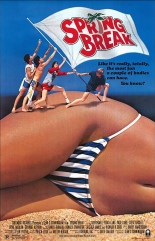 Thanks to its status as a perennial late-night movie during the ’80s and early ’90s, I’ve probably seen Sean Cunningham’s Spring Break at least six or seven times during the course of my life. But despite the number of times I’ve seen it, I’m still hard-pressed to tell you what it’s actually about.
Thanks to its status as a perennial late-night movie during the ’80s and early ’90s, I’ve probably seen Sean Cunningham’s Spring Break at least six or seven times during the course of my life. But despite the number of times I’ve seen it, I’m still hard-pressed to tell you what it’s actually about.
Here’s what I can remember: There are two dorks (David Knell and Perry Lang) and two non-dorks (Paul Land and Steve Bassett). The two dorks have a room at a hotel that’s fully booked, and the non-dorks don’t, so they convince the dorks to let them stay in their room in exchange for letting them hang out with them and enjoy their non-dorky adventures.
 One of the dorks has an important father, so there’s some concern that he shouldn’t be spring breaking and possibly ruin his father’s image, and one of the non-dorks falls in love with the really hot singer (Corrine Alphen) of an all-girl rock band (whose presence in the film is the only reason I’ve watched this movie as many times as I have).
One of the dorks has an important father, so there’s some concern that he shouldn’t be spring breaking and possibly ruin his father’s image, and one of the non-dorks falls in love with the really hot singer (Corrine Alphen) of an all-girl rock band (whose presence in the film is the only reason I’ve watched this movie as many times as I have).
Cunningham’s refusal to abide such narrative conventions as character and plot would be forgivable if he presented us with an entertaining representation of the event his film was made to celebrate, but even here, he holds back, giving us a lame spring break most of us would bitch miserably about if we had lived through it ourselves.
Subdued and tame when it should be wild and raucous, there is — as I’ve already mentioned — only one reason to party during this Spring Break and I’ve thoughtfully compiled the following video to save you the time and effort of having to experience the rest. —Allan Mott


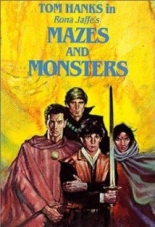
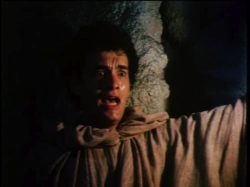 In this early Tom Hanks vehicle, the threat to humanity is LARPing (or live-action role playing for those of you who have robust social lives or haven’t seen
In this early Tom Hanks vehicle, the threat to humanity is LARPing (or live-action role playing for those of you who have robust social lives or haven’t seen 
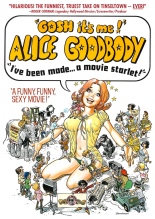
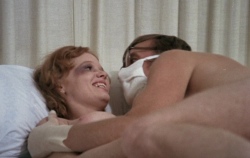 Writer/director Tom Scheuer clearly had no interest in the film’s many sex scenes, since he plays them all for laughs (with varying results), but they all benefit from the presence of his lead actress (who appeared in a lot of these movies for a good reason), which makes their ubiquity a lot easier to bear.
Writer/director Tom Scheuer clearly had no interest in the film’s many sex scenes, since he plays them all for laughs (with varying results), but they all benefit from the presence of his lead actress (who appeared in a lot of these movies for a good reason), which makes their ubiquity a lot easier to bear. 
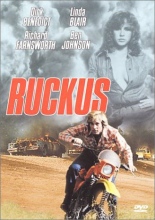
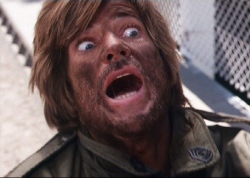 His sanity eroded by his time spent caged like an animal in a P.O.W. camp, Hanson is a disheveled, mumbling mess of a human being, which causes problems when the local small-town bigwig (Ben Johnson) sends a deputy to ask him some questions about his MIA son. Hanson has no interest in talking to anyone, but the deputy and his gang of redneck yokels refuse to take no for an answer. Unfortunately for them, what the disturbed vet may lack in social graces he more than makes up for in kicking ass!
His sanity eroded by his time spent caged like an animal in a P.O.W. camp, Hanson is a disheveled, mumbling mess of a human being, which causes problems when the local small-town bigwig (Ben Johnson) sends a deputy to ask him some questions about his MIA son. Hanson has no interest in talking to anyone, but the deputy and his gang of redneck yokels refuse to take no for an answer. Unfortunately for them, what the disturbed vet may lack in social graces he more than makes up for in kicking ass!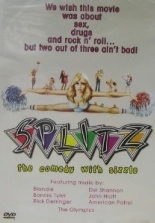
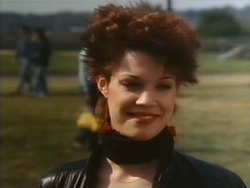 What really surprised me about Splitz was how much I was charmed by it. That’s not to say it’s a good movie — it’s far too hamstrung by the competing sensibilities of its four credited screenwriters to work as a successful whole — but I found it full of enough charming characters and worthwhile moments to allow me to patiently get through the scenes that were obviously written by whichever of the four writers was a hack-tastic moron.
What really surprised me about Splitz was how much I was charmed by it. That’s not to say it’s a good movie — it’s far too hamstrung by the competing sensibilities of its four credited screenwriters to work as a successful whole — but I found it full of enough charming characters and worthwhile moments to allow me to patiently get through the scenes that were obviously written by whichever of the four writers was a hack-tastic moron.